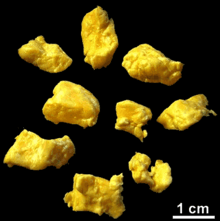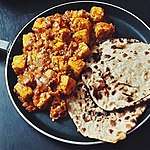Cheese curd
Cheese curds are the moist pieces of curdled milk either eaten alone as a snack, or used in prepared dishes. These are chiefly found in Quebec, Canada, in the dish poutine (made of french fries topped with cheese curds and gravy), and in the northeastern, midwestern, mountain, and Pacific Northwestern United States. Curds are sometimes referred to as "squeaky cheese".[1]

Production
Cheese curds are made from fresh pasteurized milk in the process of creating cheese when bacterial culture and rennet are added to clot the milk.[1] After the milk clots it is then cut into cubes; the result is a mixture of whey and curd. This mixture is then cooked and pressed to release the whey from the curd, creating the final product of cheese curd.[1]
Characteristics
Their flavour is mild, but can differ in taste depending on the process by which they were made. It has about the same firmness and density as cheese, but with a springy or rubbery texture.[1] Fresh curds squeak against the teeth when bitten into. This "squeak" has been described by The New York Times as sounding like "balloons trying to neck".[2] After 12 hours, even under refrigeration, cheese curds lose much of their "fresh" characteristic, particularly the "squeak", due to moisture entering the curd.[1] Keeping them at room temperature can preserve the squeakiness.
The curds have a mild flavour and are sometimes somewhat salty.[1] Most varieties, as in Ontario, Quebec, Nova Scotia, Vermont, or New York State, are naturally uncoloured. The American variety is usually yellow or orange, like most American Cheddar cheese.
Uses

.jpg)
Fresh
Fresh cheese curds are often eaten as a snack, finger food, or an appetizer. They may be served alone, dressed with an additional flavor, or with another food, such as a small smoked sausage or piece of cured pork, with the elements skewered together on a toothpick. Examples of flavorings applied to fresh curds include jalapeño chili peppers, garlic, various herbs, or spice blends such as Cajun seasoning, with garlic and dill on cheddar curds being a popular combination.[3]
Fried cheese curds
Deep-fried cheese curds are often found at carnivals and fairs, and often local non-chain fast-food restaurants and at regular restaurants and bars, as well as a few chain restaurants of local origin, such as Culver's. Deep-fried cheese curds are covered with a batter, similar to one used for onion rings, or are breaded and placed in a deep fryer. They are sometimes served with a side of ketchup, marinara sauce, or ranch dressing. They are strongly associated with the U.S. state of Wisconsin.[4]
In many areas where fried cheese curds are common, the term "cheese curds" refers to the fried variety; non-fried curds are distinguished by calling them "raw" or "plain" cheese curds.
In some areas, deep-fried cheese curds are also known as cheeseballs.[5]
Paneer
In the Indian subcontinent, fresh cheese curd is made by boiling milk and then adding an acid (vinegar, lemon juice) to curdle it. Once the milk is curdled, the watery portion is discarded and the white casein is retained. It is then put into a mold and made into a roughly rectangular or oval shape. Paneer, as it is known all over the country, is widely used in snacks, appetizers, main course, and rice biryani. It is an alternative to meat and is commonly consumed in India.[6]
Poutine
Cheese curds are a main ingredient in poutine, which originated in the 1950s in rural Quebec, Canada. It consists of french fries topped with fresh cheese curds, covered with brown gravy and sometimes additional ingredients.[1]
See also
- Cottage Cheese
- Fried cheese
- Halloumi
- Leipäjuusto (Finnish squeaky cheese)
- List of cheeses

References
- Laura Brehaut (25 October 2016). "'The taste is in the squeak': Why the key to the perfect poutine is the cheese curds — just don't refrigerate them". Vancouver Sun. Retrieved 25 June 2017.
- Louisa Kamps, "Cheese Curds," NY Times, October 17, 2004
- "Archived copy". Archived from the original on 2011-10-26. Retrieved 2011-09-12.CS1 maint: archived copy as title (link)
- Lewis, Chelsey (April 21, 2016). "Are Fried Cheese Curds Wisconsin's Most Important Food Innovation?", Milwaukee Journal Sentinel. Retrieved May 21, 2016.
- Belleville, Kansas Dairy Queen website Archived April 25, 2010, at the Wayback Machine
- "Paneer - A good substitute for meat". ZipfWorks, Inc. 2017.
| Wikimedia Commons has media related to Cheese curds. |
